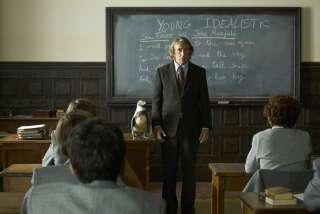Movie review: ‘Margaret’
- Share via
If you know Gerard Hopkins’ Victorian-era poem “Spring and Fall,” a reflection on the loss of innocence addressed to a young child named Margaret, you have a clue about what writer-director Kenneth Lonergan is getting at in “Margaret.” This contemporary lament, starring Anna Paquin, seems partly inspired by the poem, though Hopkins is but one of many literary references scattered about.
Here is my lament: Lonergan has created a forceful yet extremely fitful film that teases with moments of brilliance only to frustrate in the end. “Margaret” is an unrealized dream, one you wish he’d gotten as right as his 2000 debut, “You Can Count on Me”: tightly constructed, lightly played, with Laura Linney and Mark Ruffalo as disconnected siblings. “Margaret” spent the last few years locked up in editing disputes that included nasty litigation and no doubt many bruised egos, and that turbulence is clear in the untamed emotional journey on-screen.
The movie is set in New York City and rests on a collision — the classic “hit by a bus” made tragically real — and a conscience, that of 17-year-old Lisa (Paquin). (Just in case you’re looking, there is no character named Margaret, just a few lines from the poem read about midway through the film.) Although Lisa had an unintentional hand in causing the accident, she is soon playing a very intentional role in the ripple effect that follows.
But before we get there, the filmmaker, working with cinematographer Ryszard Lenczewski (“My Summer of Love”), slows everything down to create a lovely opening. It’s a busy day, and the streets are sun-drenched and filled with anonymous people hurrying places. They would be a blur, but the camera shifts from real time to capture the stream of humanity in slow motion, just enough that details and individual faces begin to emerge. Without a word, it lets you know that this will be a carefully observed piece; at its best, “Margaret” is exactly that.
Lonergan, who was a playwright before he added screenwriter and director to his résumé, favors complicated characters, and Lisa is the mess of contradictions he’s most interested in dissecting here. She’s a precocious teen from the city’s artistic set — Mom’s a Broadway regular of some renown and divorced from Dad, who’s decamped to Hollywood, where the projects are always promising, or so they seem in his weekly calls. She’s filled with disdain and works at being bored, yet relishes endless intellectual classroom debates, many colored by the political shadows of a post-9/11 New York.
But Lisa’s skirmishes with growing up are minor until the accident, an event that launches her into a guilt-fueled fury that — along with Lonergan’s astute and astringent dialogue — drives the rest of the film. Her mother, a terrifically pained J. Smith-Cameron (“You Can Count on Me” and lots of stage work) is Lisa’s primary target. Their mother-daughter warring is wonderfully primal, though Paquin, as good as she is, is such an old soul that it’s hard to buy her as a teenager, even a precocious one.
The deeper we get into the story, the more you need a flow chart to keep up. There is the bus driver (Ruffalo), whose culpability is in question. Allison Janney is Monica, the pedestrian, who’s given a long time to parse the meaning of life while the ambulance comes. There is the up and down of the police investigation, the vagaries of bus company policy and a union contract in flux. There is Monica’s back story, which Lisa wants to uncover and which comes with a new set of relationships for the teenager, including the woman’s best friend, Emily (Jeannie Berlin), who becomes a sort of surrogate mother for Lisa since she’s so disgusted with her own.
Meanwhile, Lisa is looking for love in all the wrong places — a disaffected classmate played by Kieran Culkin and a Midwest transplant of a math teacher (Matt Damon). Drugs and abortion get passing glances. And I won’t even bother you with the love interests of her parents, or the lawsuit against the bus company, or the confrontations with the bus driver, and her classmates, and her teachers, and her new friends, and her old friends, and her family.
The filmmaker has a talent for capturing the truth of relationships within the words and a sensitive hand with his actors that translates into moments of raw beauty on-screen. But this time, it’s as if Lonergan had far too much on his mind. A pity, “Margaret” was a terrible thing to waste.
More to Read
The biggest entertainment stories
Get our big stories about Hollywood, film, television, music, arts, culture and more right in your inbox as soon as they publish.
You may occasionally receive promotional content from the Los Angeles Times.










